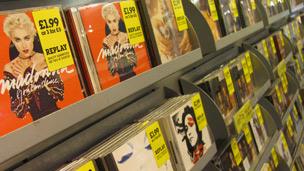Can record shops avoid extinction?
- Published

That's Entertainment sells reconditioned second-hand CDs and DVDs alongside chart titles
Record shops have become an endangered species in the last decade, but a new chain is attempting to buck the downward trend. So can music retailers avoid extinction?
Our Price, Tower Records, Virgin Megastores, Zavvi, MVC, Music Zone, Andy's, Border's and Woolworths - these are some of the national music-selling firms that have disappeared from high streets over the last 10 years.
HMV , externalis the last chain standing - but with some stores closing and profits falling, it is struggling. Meanwhile, 90% of independent record shops have shut in the last 25 years.
They have all been fighting ferocious onslaughts on several fronts. The internet has brought cheaper rivals like Amazon, Play and iTunes, not to mention illegal downloading. Supermarkets have also muscled in, while the recession has hit high street spending.
The remaining shops are starting to fight back by staging Record Store Day, external on Saturday, offering exclusive releases and in-store gigs in an attempt to pull in the punters.
But at this time of struggle, a new chain is hoping to prove that music shops are not dead.
That's Entertainment, external has branches in 12 towns, from Burton-upon-Trent in Staffordshire to North Shields in North Tyneside, and is hoping to double in size by opening another dozen shops this year.
Like HMV, it sells CDs, DVDs and games. But unlike the other chains, most of its albums are second-hand.
Founder Steve Oliver prefers the term "replay", insisting that the thorough refurbishment process - cases are replaced, discs are repaired and polished - makes them nearly new.
Crucially, they are much cheaper than the brand new versions, at between 99p and £3.99, and Mr Oliver believes people are more worried about price than whether an album is in a cellophane wrapper.
"People are watching the pounds," he says. "The value stores such as Poundland provide great value offers that are still succeeding on the high street. And we're bringing entertainment very much into that category."
Although his shops do sell some spanking new albums, the "replay" sales are more profitable, he says. Most come from sister company Music Magpie, external, which buys fans' unwanted albums, films and games.
For example, Music Magpie will pay you 30p for a copy of Madonna's American Life or Take That's The Circus, which are then sold through That's Entertainment for £1.99.
Mr Oliver, who previously ran the Music Zone chain, believes the price will be the key to the chain's fortunes.
"You and I will still go into a pub on a Friday night and put £1 in a jukebox to listen to a song once," he says. "So our price is a very low decision-making price point. It's almost a can of pop and sweets."
That's Entertainment's bargain basement offer is an example of how much music shopping has changed in recent years.
In 2010, there were more than 6,500 shops selling music in the UK - but only 8% of those were specialist shops, with the rest being supermarkets, petrol stations and department stores, which mainly stock chart releases or a few cheap compilations.
Independent record shops have taken a particular hit in recent years. There were 2,600 in the mid-1980s, according to Graham Jones, a former record sales rep and author of Last Shop Standing: Whatever Happened to Record Shops?, external Last year there were 281.
But that is a rise of 12 from 2009, the first increase for years.
"The situation in the independent sector is better than it's been for a long time," Mr Jones says. "You reach a point when the only shops open are great record shops. You've got to be good to have survived."

HMV has said it will close 60 stores this year
He believes the number of stores will remain steady over the next five years - as long as the Chancellor follows through on a promise to clamp down on online retailers that ship CDs and DVDs from the Channel Islands without charging VAT.
"That has been the silent killer of record shops - that's what has closed record shops over the last five years," he says.
Entertainment Retailers' Association, external chairman Paul Quirk, who ran four record shops in Merseyside and Lancashire before moving online, external, says the best record shops have had to adapt to survive.
"At one time you could just stand behind the counter," he says. "The people that did that have got to morph into something different.
"They're selling tickets, they're putting gigs on, they're putting bands on in store, they're opening coffee shops in store, they're online as well - all the things that you need to do these days to make a living."
HMV, meanwhile, has adapted by selling more DVDs, games, books, gadgets and merchandise as well as music. That has not prevented the company, which also owns the Waterstones book shops, from issuing three profits warnings this year and announcing plans to close 60 stores.
"HMV had a great opportunity to be the best record store in the world, and they moved away from that," Mr Jones believes. "It's more an entertainment centre now, it's not a record shop.
"It just tends to have the classic back catalogue or chart CDs - a lot of the stuff you can get cheaper from the supermarket or online."
'Increasingly niche'
Eighty-five per cent of albums are still sold on CD and most observers accept that HMV's presence on high streets is crucial for the survival of record shopping as we know it.
But there does not seem to be a lot of real affection for the old dog - in contrast to the loyalty felt towards the best independent shops.
Tim Robinson, a music fan who has set up the Recordshopcity , externalwebsite to promote Greater Manchester's 25 independent record shops, says such stores will continue to cater to a dedicated group of connoisseurs for the foreseeable future.
"If HMV disappeared off the high street, that's the not the end of it," he says. "It would reflect the fact that buying music on a physical format is increasingly a niche activity. But I don't think it will disappear completely."
- Published5 April 2011
- Published12 January 2011
- Published10 January 2011
- Published6 January 2011